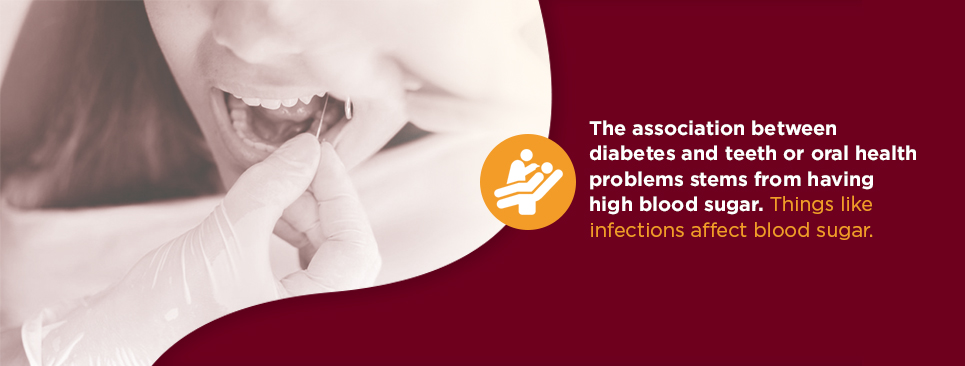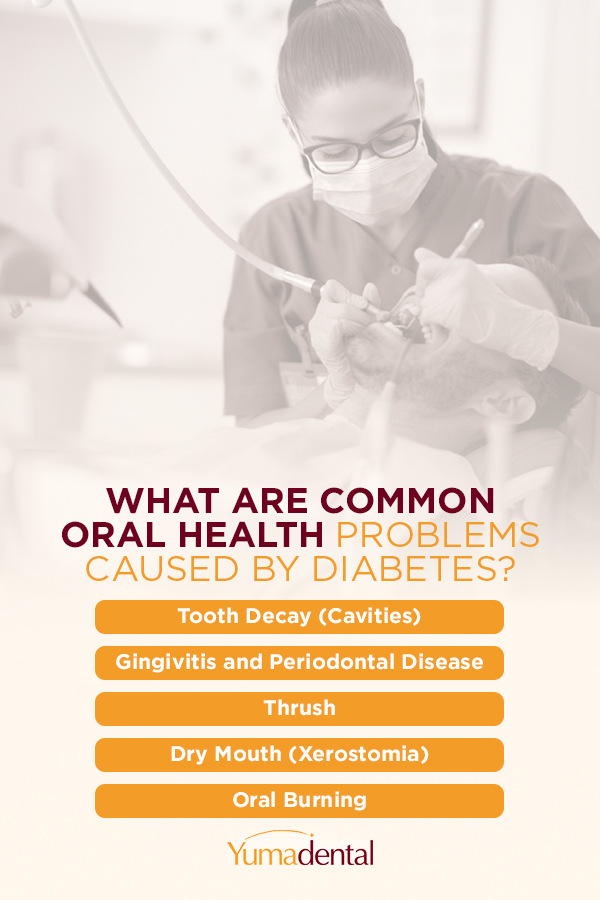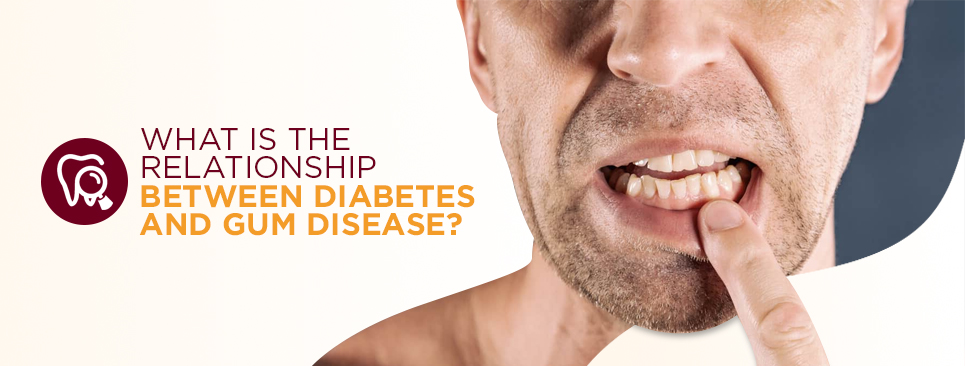Around 29 million individuals living in the U.S. have diabetes. That’s over 9% of the population. Each year, there are nearly 1.7 million new cases diagnosed. Over 8 million individuals live with diabetes without realizing it.
If you’re like a lot of people, when you think of diabetes, the first thing that typically comes to mind is insulin shots or other medicines. And, you may know the high blood sugar characteristic of uncontrolled Type I and II diabetes can lead to health problems affecting the kidneys, eyes, heart and nerves.
However, what you may not know is diabetes and oral health problems can go hand-in-hand. Here, we discuss diabetes and dental health, including how they’re connected, what teeth and gum problems you can experience and how your Yuma dentist can help support your good oral health if you have diabetes.
Table of Contents
How are Diabetes and Dental Health Connected?
Diabetes can affect both adults and children. If left untreated, it can cause chaos in your body, with symptoms ranging from fatigue to loss of consciousness. But, it can also wreak havoc in your mouth.
1. Infections
The association between diabetes and teeth or oral health problems stems from having high blood sugar. Things like infections affect blood sugar. If you don’t control your blood sugar properly, you’re more likely to develop oral health problems, because uncontrolled diabetes can weaken your white blood cells, which defend your body against bacterial infections that could occur in your mouth.
2. Gingivitis and Periodontal Disease
Everyone has tiny bacteria that live in their mouths. If these bacteria make a home in your gums, they can cause the gum diseases gingivitis and periodontal disease. Gingivitis is a mild form of gum disease but can advance to a more severe form known as periodontal disease. Periodontal disease is the most common oral disease that affects people who have diabetes. It affects almost 22% of those diagnosed with diabetes, according to the American Dental Association (ADA).
Periodontal disease is a chronic inflammatory disease that can damage your gums, the tissues that hold your teeth and even your bones. Particularly with increasing age, uncontrolled blood sugar increases your risk for gum issues. When you have diabetes, you’re at a greater risk of gum issues due to poor blood sugar control. Like with all infections, severe gum disease can cause a rise in blood sugar, making diabetes more difficult to control since you’re more vulnerable to infections and less able to fight the gum-invading bacteria.
What Are Some Symptoms of Oral Health Problems Associated With Diabetes?
Symptoms of diabetes and oral health issues include:
- You could have less saliva, making your mouth dry. Certain medications also cause dry mouth.
- You could have a greater risk of cavities since saliva protects your teeth.
- You might experience issues tasting food.
- Your gums might become inflamed and bleed more frequently, which often indicates gingivitis.
- You might experience a delay in wound healing.
- Your teeth might erupt at an earlier age than what’s usual if you’re a child with diabetes.
- You might be vulnerable to oral infections.
What are Common Oral Health Problems Caused by Diabetes?
Whether you have Type I or II diabetes, you need to manage your blood sugar level. The higher your blood sugar level gets, the greater your risk of oral health problems like:
1. Tooth Decay (Cavities)
You have many kinds of bacteria in your mouth. When sugars and starches in foods and drinks interact with these bacteria, they form a sticky film on your teeth called plaque. The plaque acids attack the dentin and enamel on your teeth’s surfaces, leading to gum disease and cavities. The higher you allow your blood sugar level to get, the bigger the supply of starches and sugars, and the more acid you allow to wear away at your teeth.
As the tooth decay gets larger, it could cause symptoms like:
- Toothache
- Mild to sharp pain when you eat or drink something hot, cold or sweet
- Tooth sensitivity
- Noticeable pits or holes in your teeth
The signs of cavities vary and depend on their location and extent.
2. Gingivitis and Periodontal Disease
Can diabetes cause gum disease?
If you have diabetes, you have a greater chance of developing periodontal disease than those without diabetes. If you have diabetes and periodontal disease, it can progress more quickly to tooth loss. You might also struggle with dry mouth, which leads to insufficient saliva. If you don’t have enough saliva to neutralize your mouth’s acids, it leaves the remaining bacteria free to cause tooth decay.
Aside from weakening white blood cells, diabetes causes another complication where your blood vessels thicken. This slows the flow of waste products from and nutrients to your body tissues, including your mouth. When this occurs, your body loses its ability to fight infections. Because periodontal disease is a type of bacterial infection, you may experience more severe gum disease more often if you have uncontrolled diabetes.
Gum disease problems can progress with few obvious signs and without any pain, even in the later stages of gum disease. While the signs of periodontal disease are frequently subtle, the disease isn’t entirely without any signs. Gum disease symptoms include:
- Bleeding gums during and after you brush your teeth
- Receding gums
- Swollen, red or tender gums
- Formation of deep pockets between your gums and teeth
- Persistent bad taste in your mouth or bad breath
- Shifting or loose teeth
- Changes in how your teeth come together when you bite down or with the fit of partial dentures
Even if you don’t notice any signs, you could still have gum disease to some degree.
3. Thrush
As with bacteria, fungi also like sugar. Individuals with diabetes often suffer from thrush — a fungal yeast infection. Those who take antibiotics frequently are particularly prone to fungal infection development of the tongue and mouth. The fungus thrives on high glucose levels in saliva in those with uncontrolled diabetes. Also, wearing dentures can cause fungal infections, particularly if they’re worn constantly. Thrush can lead to red or white spots on the inside of your cheeks and tongue. They can sometimes turn into open sores.
4. Dry Mouth (Xerostomia)
As mentioned, with diabetes, you could experience a reduction in saliva, which leads to dry mouth. When you don’t have enough saliva to bathe your teeth and keep your mouth moist, it could increase your risk of gum disease, tooth decay and thrush. Since diabetes can increase your chances of dry mouth, it also increases your chance of having bad breath. Dry mouth can also lead to infections and ulcers in your mouth and cavities in your teeth.
Dry mouth is common in both Type I and II diabetes. Not all diabetics experience dry mouth. If you do, the symptoms you may experience are:
- A lack of moisture in your mouth
- A dry, rough tongue
- Chapped and cracked lips
- Frequent pain in your mouth
- Infections in your oral cavity
- Sores in your mouth
- Trouble with talking, swallowing or chewing
5. Oral Burning
Have you ever felt as though your mouth was on fire or like you scaled your mouth? This painful sensation can also spread to your gums, lips, tongue and inside your cheeks. Oral burning of your mouth or burning mouth syndrome can have no noticeable signs, and it could last for months or years. There could also be a link between burning mouth syndrome and diabetes. Therefore it’s easier to detect and treat in individuals who have diabetes.
Burning mouth syndrome symptoms include:
- A sensation of dry mouth with enhanced thirst
- A scalding or burning sensation affecting your tongue mostly, or gums, lips, throat and palate or the whole mouth
- Loss of taste
- Taste changes in your mouth like a metallic or bitter taste
- Stinging, tingling or numbness in your mouth
Oral burning discomfort usually has a few different patterns. It might:
- Occur every day and cause little discomfort when you rise in the morning, but worsen as your day progresses
- Come and go
- Start the minute you wake up and last throughout the entire day
If you smoke, you have a higher risk of oral health problems. You’re more likely to develop periodontal disease and thrush than non-smokers.
What is the Relationship Between Diabetes and Gum Disease?
There’s an association between gum disease and diabetes. The relationship seems to go both ways. Studies show having a severe gum infection can make it harder to control blood glucose levels.
For instance, according to the U.S. National Health and Nutrition Examination Survey (NHANES) III studied HbA1c, a lab test which shows your average blood sugar level over the past few months, indicating how well you control your diabetes. Those with a 9% HbA1c level had a substantially higher severe periodontitis prevalence than those without diabetes after controlling for ethnicity, age, sex, education and smoking.
Most of the research was on Type II diabetes as a periodontal disease risk factor, likely because both conditions have historically tended to develop in individuals between the ages of 40 and 50. But, Type I diabetes also raises your risk of periodontitis. One study showed that nearly 10% of children with Type I diabetes had increased bone loss and attachment loss compared with controls, regardless of their comparable plaque scores.
Research shows individuals with uncontrollable blood sugar seem to develop gum disease more severely and more often than those who manage their diabetes well.
- Diabetes reduces your body’s resistance to infection, increasing the likelihood of your gums becoming infected.
- Diabetes slows circulation, potentially making your gum tissues more vulnerable to infections.
- If you smoke, you have a greater risk of developing gum disease than those who smoke but don’t have diabetes.
- High glucose levels in your saliva promote the bacteria growth that causes gum disease.
- Poor oral hygiene is a significant factor for everyone in gum disease, but it’s more so when you have diabetes.
There’s a clear relationship between the severity of periodontitis and the degree of hyperglycemia. The mechanisms that underpin the association between both conditions aren’t totally understood but involve aspects of neutrophil activity, immune functioning and cytokine biology.
Incidences of end-stage renal disease and macroalbuminuria are increased threefold in individuals with diabetes who also have severe periodontitis when compared to those with diabetes but without severe periodontitis.
Also, the risk of cardiorenal mortality, which is diabetic nephropathy and ischemic heart disease combined, is three times as high in individuals with diabetes with severe periodontitis than in those with diabetes but without severe periodontal disease. Periodontitis treatment is linked with a reduction in HbA1c of around 0.4%. Periodontal and oral health should be integral components in the management of diabetes.
Importance of Visiting the Dentist if you Have Diabetes
Just as research shows when you control your blood sugar levels, you lower your risk of diabetes-related complications to major organs, so too can controlling diabetes protect against oral health problem development.
Regular dental care visits are essential if you have diabetes. Potential benefits you realize include the following:
- Slowing the progression of diabetes: Research shows gum disease treatment could help improve control of blood sugar when living with diabetes, thereby reducing the disease’s progression. Teamwork involving professional care from a dentist and self-care will be beneficial to keep your smile healthy and possibly slow the progression of your diabetes.
- Reducing HbA1c: Having professional cleanings by a dentist and practicing proper oral hygiene can help lower your HbA1c.
- Identifying gum disease: If you have diabetes or smoke regularly, let your dentist know. They’ll likely see signs of gum disease before you will.
- Diagnosing and treating periodontal disease: In a routine exam and cleaning, the dentist will measure how deep the pockets are around your teeth. If the pocket depth is more than 3 millimeters, it could suggest periodontal disease.
- Identifying and treating bone loss: The dentist might also take X-rays to see if you have bone loss. If necessary, they may refer you to a periodontist, which is a specialist in gum disease.
- Reducing risk of getting an oral infection: Taking care of your mouth and teeth is particularly important when you have diabetes since the disease causes a higher risk of oral infection and can also slow down the healing process.
Seeing a dentist regularly when you have diabetes and learning as much as possible about handling your dental treatment and diabetes is important so you can closely work with your dentist to maintain good oral health and avoid complications.
Contact Yuma Dental to Schedule Your Dental Appointment
If you suspect oral health problems, contact Yuma Dental — a premier Yuma, Arizona, dentist. We’re dedicated to improving the aesthetics and health of your mouth. We also provide dental treatment for diabetic patients. Being an American Dental Association member, our bilingual dentists are professionals and experts in corrective and cosmetic dentistry.
We provide a wide range of different dental services, including:
- Teeth restoration: Dental bridges, dentures, crowns and treatment for cavities.
- Routine dental care: Teeth whitening, teeth cleaning and optional aesthetic treatment.
- Dental surgery: Root canals, corrective surgery and gingivitis treatment.
As you’ve learned, many health conditions can exhibit symptoms can manifest inside your mouth, like diabetes. Therefore, a dental exam can detect these conditions’ symptoms, so we can refer you to the proper physician for treatment of that condition.
The good news is that, with early detection, treatment is more effective and can reduce symptoms or cure the problem before any serious harm can come to your health. So, you should see by now the importance of a regular dental checkup to ensure your teeth are healthy and to give you peace of mind your long-term health will stay intact too. Our dentists and hygienists will be by your side through each step of your dental experience. Contact us today to schedule your appointment for your dental exam.
















